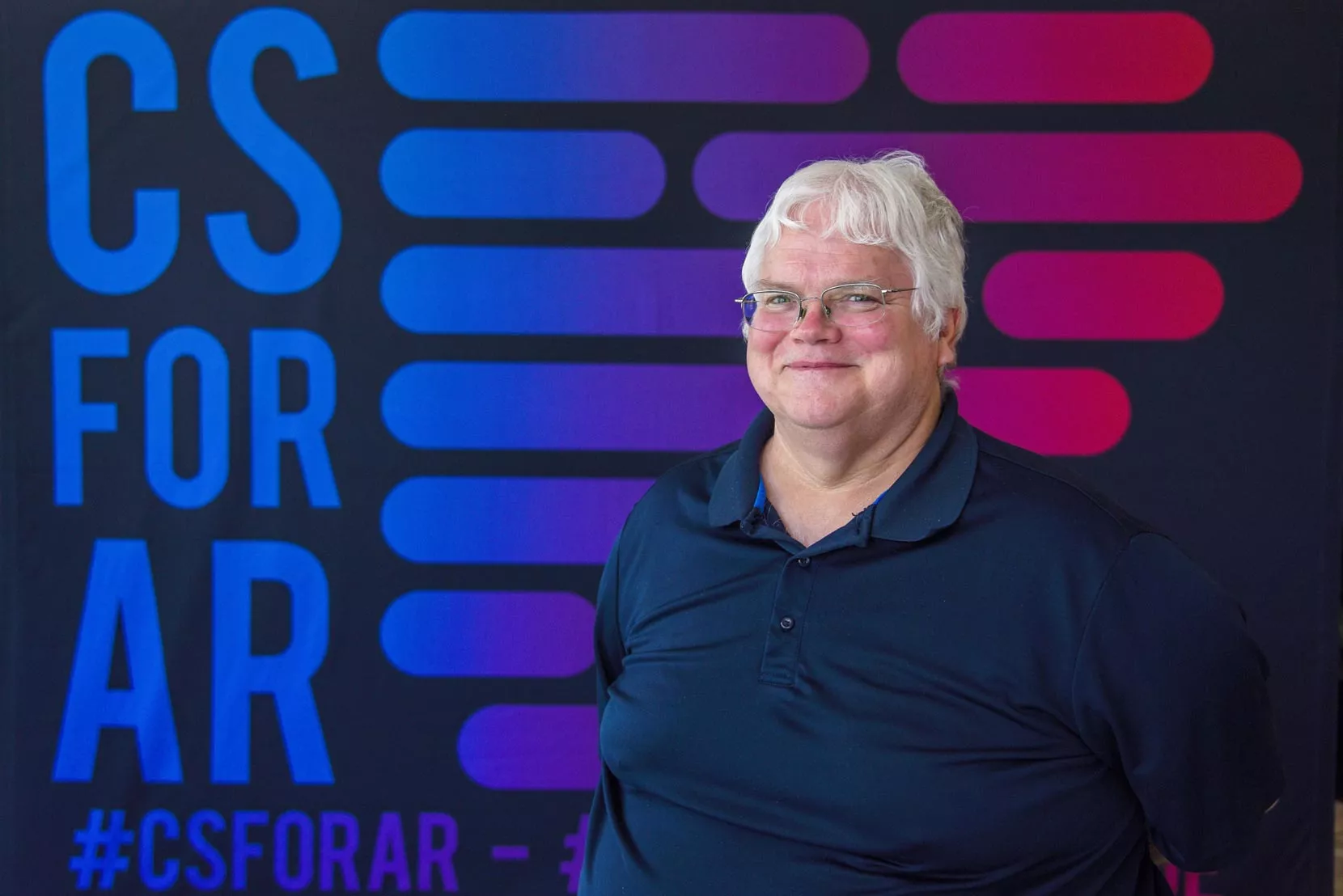“There’s still going to be welding, still automotive, but now those are higher tech,” Frank said. “Newer disciplines are also part of CTE now. They’re adding Information Technology focused jobs, network security, cyber security – which is quite exciting.”
Frank, a Computer Science Teacher at the Arkansas School for Mathematics, Science and the Arts in Hot Springs was just named to a National Career and Technical Education Advisory Council that aims to lead a national dialog focused on accelerating career pathways in technology. He will serve as one of three representatives from Arkansas as the Computing Technology Industry Association council designs strategies to diversify the tech workforce and shape the future of CTE tech curriculum.
“I want to make sure students who might see themselves going straight into the workforce have the technology training and background to succeed in whatever path they choose,” he said. “There is a lot of CTE coursework in schools in Arkansas, but this organization is more focused on technologybased curriculum.”
As the cost of college rises, tech-focused CTE offers students another path into the growing tech industry. According to CompTIA, in January U.S. employers advertised more than 232,000 job openings for core IT positions.
“CTE holds great promise as the to fill this need, and to do so in a way that minimizes the cost of acquiring skills and accelerates the process of preparing people with the employability skills that allow them to contribute from day one on the job,” said Angel L. Pi eiro Jr., vice president, strategic academic relationships, at CompTIA. “With the help of an elite group of educators and other leaders we intend to raise national awareness of CTE as a creator of opportunities for careers that will provide a better way of life for multiple generations to come and to do so in a way that addresses digital inequity head-on.”
Those jobs can also often be filled remotely, providing opportunities in parts of the state where other options are lacking.
“People could do their work at home and do their work in the communities in which they were raised,” Frank said. “I think job growth will pick up as computer science becomes more prominent as a career.”
Arkansas Governor Asa Hutchinson also recognizes the potential, and has made a push to increase computer science education across the state. In addition to requiring new classes, the Governor created a coding competition where students compete to solve problems at regional and statewide events.
“There will be a variety of problems so that, if a particular task is not something the students have encountered, they still have other avenues to solve the problem,” Frank explains.
Frank and a colleague recently led a team from his school into the finals in the Arkansas Governor’s Coding Competition, and he was also named as one of five finalists for Arkansas computer science teacher of the year.
“I think Arkansas is doing a great job of leading the way in the nation in computer science,” Frank said. “I think it will be good for the economic engine of the state.”
With three decades of work experience in education, Frank says his classes haven’t changed much, other than the programming language currently in use. However, as computers are increasingly part of our daily lives – from smartwatches to automobile systems – he expects interest in the profession to continue to grow.
“A lot of times students knew, ‘I want to be a doctor, lawyer firefighter or police officer,’ because they had relatives that served those roles or they saw those roles on tv,” he said. “You might not have a family member that’s a computer programmer. The discipline is rather new compared to other career paths.”
Even if a student ends up choosing to pursue something else, Frank says the skills developed in his courses are valuable. “It is essentially this core problem solving, which is a skill that anybody can use, no matter what they do in life,” he said. “It’s very rewarding I think for all teachers to impact the students’ lives.”
While Frank knew he wanted to teach, his path to the classroom was different than many high school teachers. After pursuing a master’s degree, Frank started working for a software company where he programmed automatic teller machines for banks and credit unions. When a job opened at his undergraduate alma mater, Henderson State University, he jumped at the chance.
After another university teaching stint in Oklahoma, he returned to work for the Arkansas Department of Education before landing at the school for Math and Sciences.
“Sometimes we’ve got the ability to teach courses based on our interests,” he said. “If you’ve got a teacher that’s really into genetics, we may have a genetics course and then if that teacher leaves and we get someone who’s a marine biologist, so the courses do reflect the personalities of the teachers there.”
That also means many of the educators, including Frank, take an alternative path to licensure. Even though he wasn’t sure he qualified for all of the benefits offered by the AEA, he joined
“I wasn’t even sure if there was much the organization could do for us,” he said. “You’re taking a lot of people directly from industry or out of the college environment, and they might not have followed the traditional path toward educator licensure.”
But he was familiar with the AEA’s work to improve student learning and educator working conditions.
“I felt that I was benefiting from those that had gone before me. I wasn’t sure if my role currently as an unlicensed educator, whether those benefits would apply to me or not, but I felt that it was the right thing to do,” he said. “Everything from duty free lunch and class size management, there just has been so many things AEA has been impactful for that I felt that joining was what you should do, and I’ve never regretted it.”
